
 Winter weather creates unique challenges for polyurethane slab lifting operations. As temperatures drop, proper equipment care becomes essential for successful projects. Here are vital tips to keep your rig running smoothly during cold weather and properly stored at season's end.
Winter weather creates unique challenges for polyurethane slab lifting operations. As temperatures drop, proper equipment care becomes essential for successful projects. Here are vital tips to keep your rig running smoothly during cold weather and properly stored at season's end.
Cold Weather Operation Essentials
Operating in cold conditions requires specialized heating equipment. The proper function of the pump's A/B preheaters and the hose heater is the biggest factor for pumping in cold weather. Without these heaters, the material cannot warm up or stay warm. Additionally, heated hoses with copper coils or internal wiring keep material flowing smoothly through the system.
Temperature Management Strategies
Maintaining the correct material temperature is crucial for optimal performance. Therefore, barrel temperatures should stay between 70° and 80° Fahrenheit. During winter months, achieving these temperatures takes longer due to overnight cold. Consequently, keeping barrel heaters running overnight can help maintain proper temperatures. Most importantly, regular material recirculation ensures consistent heating throughout the system.
Winter Storage and Maintenance
Proper end-of-season maintenance protects your investment. Flush the pump system thoroughly with Alchatek Pump Flush until all iso discoloration disappears. Run the end of the hose through cheesecloth to catch crystallized iso particles. Finally, fill the system with Alchatek Pump Saver 195 for long-term storage. For detailed step-by-step instructions, contact the Alchatek support team at 404-618-0438.
Safety First: Winter Precautions
Safe winter operations require proper protective equipment. Start with appropriate goggles and a respirator. Furthermore, always work in well-ventilated areas to ensure adequate air circulation.
Expert Support When You Need It
Cold weather operations can present unexpected challenges. Contact Alchatek's technical support team at 404-618-0438 for specific questions or detailed guidance.



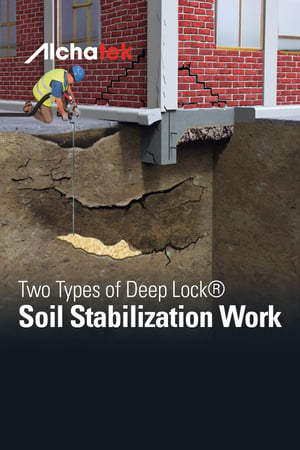 Deep Lock® is an innovative process developed by Alchatek that utilizes high-quality structural polymers to address deep soil issues. This powerful, painless, and rapid solution stabilizes soil at all levels, ensuring long-lasting results with minimal disruption to the property. This article profiles the two main types of Deep Lock® soil stabilization work and the specific situations in which each type is most effective.
Deep Lock® is an innovative process developed by Alchatek that utilizes high-quality structural polymers to address deep soil issues. This powerful, painless, and rapid solution stabilizes soil at all levels, ensuring long-lasting results with minimal disruption to the property. This article profiles the two main types of Deep Lock® soil stabilization work and the specific situations in which each type is most effective.

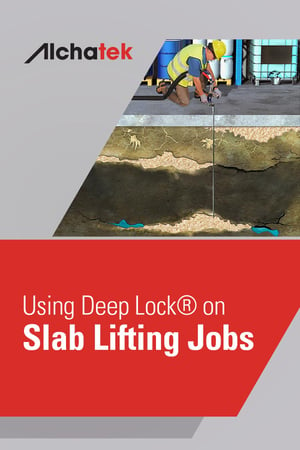 While Alchatek's Deep Lock® process is primarily used on deep soil stabilization jobs, there are specific situations in which deep soil stabilization may be needed to reinforce soil on slab lifting jobs. In cases where slabs are bearing heavy loads, have significantly loose soil underneath, or are located in areas where access is limited, incorporating the Deep Lock® process can help address the underlying soil stability issues. With the addition of the Deep Lock® soil stabilization process, contractors can achieve effective, minimally invasive slab lifting results while simultaneously improving the long-term stability of the foundation.
While Alchatek's Deep Lock® process is primarily used on deep soil stabilization jobs, there are specific situations in which deep soil stabilization may be needed to reinforce soil on slab lifting jobs. In cases where slabs are bearing heavy loads, have significantly loose soil underneath, or are located in areas where access is limited, incorporating the Deep Lock® process can help address the underlying soil stability issues. With the addition of the Deep Lock® soil stabilization process, contractors can achieve effective, minimally invasive slab lifting results while simultaneously improving the long-term stability of the foundation.
 Before embarking on any bird bath repair project using the Deep Lock® process, it's crucial to consult with industry specialists. The Alchatek support team, with extensive experience in advanced pavement repair techniques, offers invaluable insights for assessing site conditions, choosing appropriate materials, and implementing effective repair strategies.
Before embarking on any bird bath repair project using the Deep Lock® process, it's crucial to consult with industry specialists. The Alchatek support team, with extensive experience in advanced pavement repair techniques, offers invaluable insights for assessing site conditions, choosing appropriate materials, and implementing effective repair strategies.
 In the previous post, the causes and consequences of bird baths in road pavement were explored. Now, attention will turn to an innovative solution for repairing these issues: the Deep Lock® process.
In the previous post, the causes and consequences of bird baths in road pavement were explored. Now, attention will turn to an innovative solution for repairing these issues: the Deep Lock® process.
 Have you ever noticed shallow, pond-like formations on the surface of roads, particularly in private neighborhoods, subdivisions, or parking lots? These are known as "bird baths" in the road surface, and they're more than just a quirk of the road. They signify deeper issues in road maintenance and safety that are crucial to address.
Have you ever noticed shallow, pond-like formations on the surface of roads, particularly in private neighborhoods, subdivisions, or parking lots? These are known as "bird baths" in the road surface, and they're more than just a quirk of the road. They signify deeper issues in road maintenance and safety that are crucial to address.
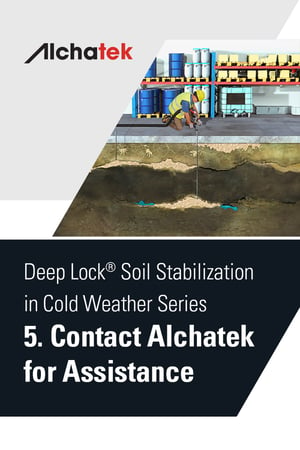 If you're a contractor grappling with deep soil stabilization challenges or looking to expand service offerings, Alchatek offers comprehensive support and training to elevate skills and expand business opportunities. Here's how the Alchatek team can assist you in enhancing your Deep Lock® soil stabilization capabilities:
If you're a contractor grappling with deep soil stabilization challenges or looking to expand service offerings, Alchatek offers comprehensive support and training to elevate skills and expand business opportunities. Here's how the Alchatek team can assist you in enhancing your Deep Lock® soil stabilization capabilities:
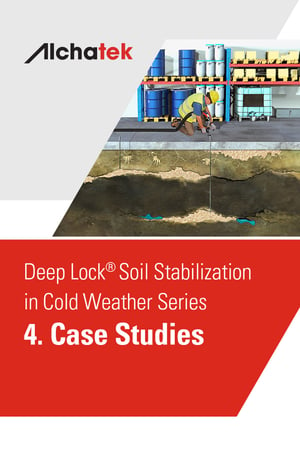 This post features three case studies that highlight the versatility and effectiveness of the Deep Lock® process across a variety of applications.
This post features three case studies that highlight the versatility and effectiveness of the Deep Lock® process across a variety of applications.
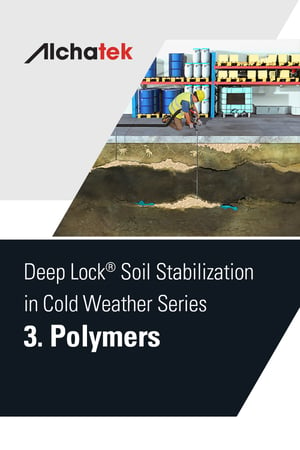 In the world of soil stabilization and concrete leveling, the choice of materials is as important as the technique used. Alchatek's Deep Lock® process utilizes a range of specialized structural polymers, each designed to cater to specific stabilization needs.
In the world of soil stabilization and concrete leveling, the choice of materials is as important as the technique used. Alchatek's Deep Lock® process utilizes a range of specialized structural polymers, each designed to cater to specific stabilization needs.
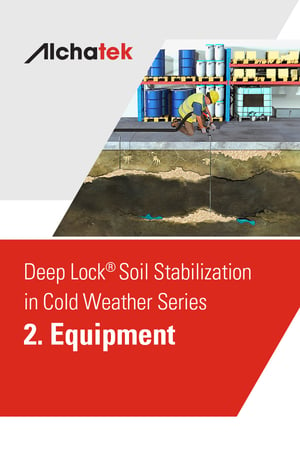 The Deep Lock® process, a robust and effective method for soil stabilization, requires specialized equipment to ensure precision and efficiency. Here's a breakdown of essential equipment for Deep Lock® soil stabilization in cold weather:
The Deep Lock® process, a robust and effective method for soil stabilization, requires specialized equipment to ensure precision and efficiency. Here's a breakdown of essential equipment for Deep Lock® soil stabilization in cold weather: